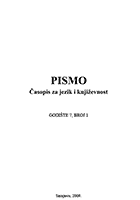Crni album – preispitivanje ideoloških dihotomija u svijetu implozija
The Black Album – Questioning Ideological Dichotomies in the World of Implosions
Author(s): Faruk BajraktarevićSubject(s): Literary Texts
Published by: Bosansko filološko društvo
Keywords: fundamentalizam; liberalizam; postmodernizam; pop muzika; interpretacija; identitet; Vogue; drag; pogled; dominacija; komodifikacija; ideologija; supkultura; apropriacija
Summary/Abstract: In his second novel, The Black Album (1995), Hanif Kuresihi expresses severe criticism towards the grand narratives of fundamentalism and liberalism, depicting them both as coercive discourses of power that resort to violent methods in the face of a potential threat. Kureishi renounces the possibility of any single story claiming primacy over another, insisting on existence of as many stories as needed in order to promote understanding and tolerance. Seeing the majority of literary works as no longer capable of conveying messages of the necessary recognition of hybridized identities to young people, Kureishi recognizes pop music as an ideal point from which alternative stories of identity could be told. He expressed his respect to some of the leading figures of pop music of the sixties and seventies in various interviews and articles such as ‘Eight Arms to Hold You’, but The Black Album is definitely the greatest homage to pop, for its messages of tolerance and protest against censorship are mapped against works of pop music icons such as Prince, The Beatles and Madonna. Their works are used to express adamant opposition to grand narratives of cultural chauvinism, racism, patriarchy etc. The paper discusses the ways in which the main characters of the novel, Shahid Hassan and Deedee Osgood, embody the postmodernist ideas of identity in relation to religion, ethnicity and gender, expressed by the above artists.
Journal: Pismo - Časopis za jezik i književnost
- Issue Year: 2009
- Issue No: 07
- Page Range: 335-351
- Page Count: 17
- Language: Bosnian

